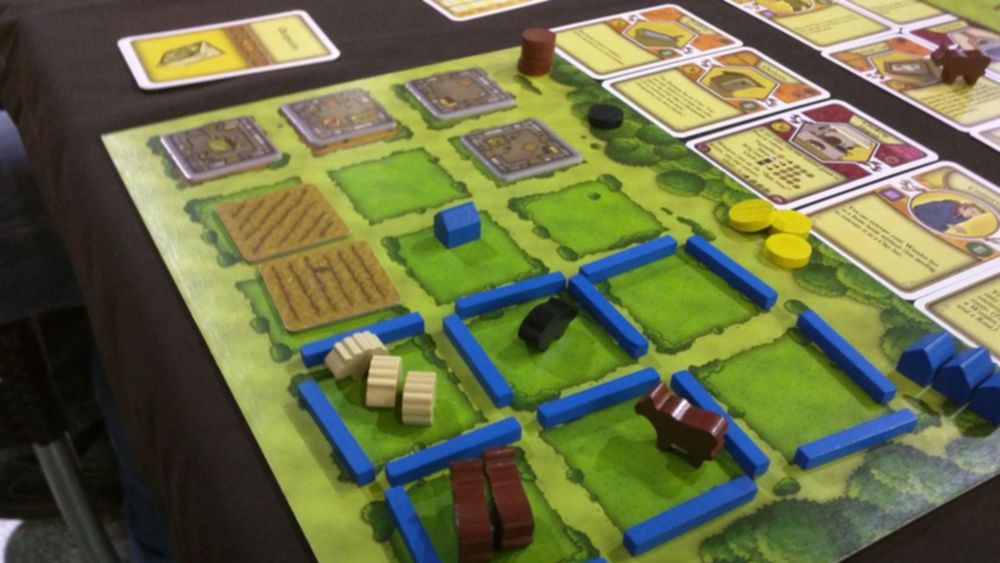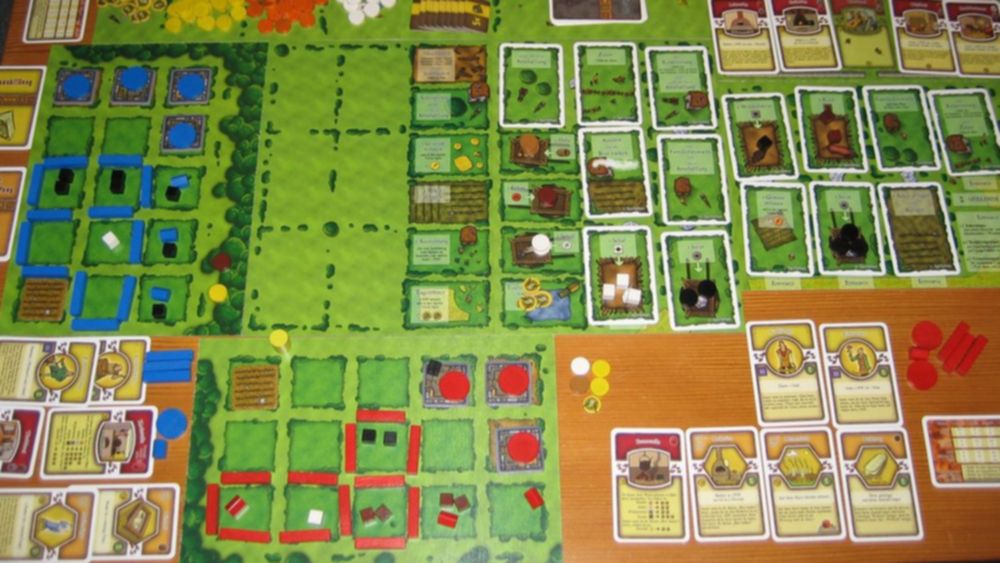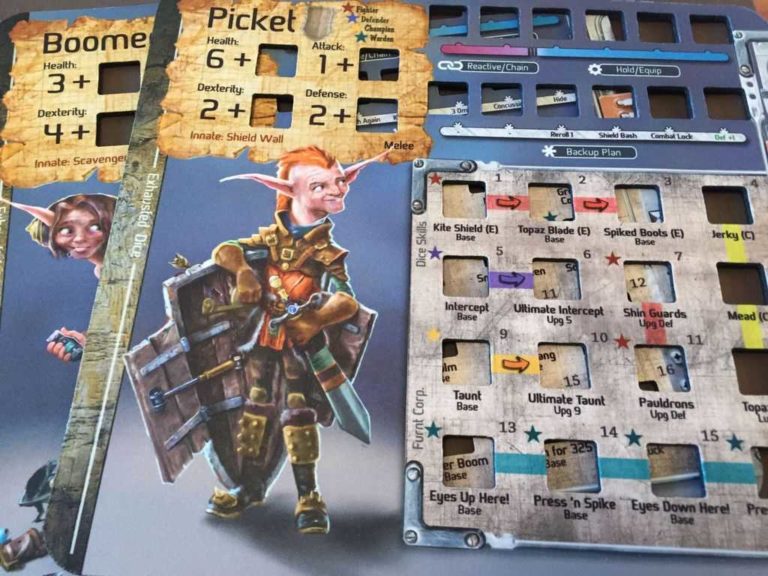In-Depth Agricola Review: Is It Still Worth Playing?
In-Depth Agricola Review: Is It Still Worth Playing?
Embarking on a journey through the rich and demanding farmlands of Agricola, one can’t help but be enveloped in a world that is as strategic as it is immersive. In this Agricola review, I’ll share my experiences and detailed observations that have solidified this game as a mainstay in my expansive board game collection. Agricola is not just a game; it’s a battle of wits, patience, and resource management that promises a unique adventure every time the box is opened. With years of play under my belt, the memories made around this game are as plentiful as the strategies that have been employed.
Key Points:
- Agricola is a strategic and immersive farming board game known for its depth and replayability.
- Key gameplay elements include worker placement, resource management, family growth, and periodic harvest rounds.
- The revised edition of Agricola improved artwork, card balance, rule clarity, and components over the original version.
- Agricola is a defining game in the worker placement genre, offering a high level of complexity and player interaction.
- Expansion packs like Farmers of the Moor and various deck packs enhance Agricola’s depth and replay value.
- The game offers accessibility for new players through a family version and player aids, easing the learning curve.
- Agricola’s enduring appeal lies in its strategic depth, social interaction, and thematic immersion in farm-building.
From the first time I laid eyes on its intricate components and grasped the depth of its gameplay, Agricola has been a source of countless game nights filled with laughter, frustration, and the sweet taste of victory. Its staying power in my game rotation speaks volumes, but whether it still holds its ground in the ever-evolving board game landscape is something I’m eager to dissect for both seasoned players and newcomers alike.
The Essence of Agricola
At its heart, Agricola is a game about farming – but it’s like no farm you’ve ever seen. Players start with a modest plot of land and a dream to build the most prosperous farm. Through strategic placement of workers, managing limited resources, and planning for the future, each player competes to have the most well-rounded farm by the game’s end. The challenge of providing for your family while expanding your farm makes every decision critical and every victory satisfying.

Overview of Gameplay Mechanics
Agricola is masterfully designed around the worker placement mechanism, where players take turns placing their workers on various action spaces to gather resources, build structures, or expand their farms. Here’s a brief breakdown of its core mechanics:
- Worker Placement: Players choose spaces to perform actions, from collecting wood to building rooms in their house.
- Resource Management: Careful allocation of resources like food, wood, and stone is crucial.
- Family Growth: Expanding your family allows for more actions but requires more food to sustain.
- Harvesting: Periodic harvest rounds require players to feed their family and can provide new resources.
Each component and mechanic seamlessly integrates to create a rich tapestry of strategic options and paths to victory.
Agricola offers a strategic blend of worker placement, resource management, family growth, and harvesting mechanics for an engaging gameplay experience.
The Evolution of Agricola: Original vs Revised Edition
The transformation from the original to the revised edition of Agricola brought significant changes, enhancing the gameplay and accessibility while retaining the core experience that players love. Here’s a comparison table highlighting the key differences:
| Aspect | Original Edition | Revised Edition |
|---|---|---|
| Artwork and Design | Functional but dated | Modernized and refreshed |
| Card Balance | Some imbalance in occupations and improvements | Better balanced and streamlined |
| Rule Clarity | Some ambiguities in the rules | Revised and clarified |
| Components | Standard wooden pieces | Upgraded components and animal meeples |
This evolution ensures that Agricola remains relevant and enjoyable, marrying the complexity and depth of the original with improvements that appeal to a wide audience.

Agricola’s Place in the Worker Placement Genre
Agricola not only earned its place in the pantheon of worker placement games but also helped define the genre. Its intricate blend of resource management, strategic planning, and player interaction sets a high bar for games within this category. Agricola challenges players to think ahead, adapt to the ever-changing landscape of available actions, and judiciously manage their resources and family. This depth, coupled with the thematic immersion of growing a farm, solidifies Agricola‘s enduring legacy in the board gaming world.
Agricola’s complexity and strategic depth set a high standard for worker placement games, challenging players to plan ahead and manage resources effectively while immersing them in the theme of farm management.
Delving into the Agricola Experience
Exploring the depths of Agricola is akin to walking through your own living, breathing farm. Each play brings new strategies to the forefront, demanding adaptability and foresight. The game’s replayability is bolstered by an assortment of occupation and improvement cards that ensure no two games are alike. Whether you’re a seasoned farmer or stepping into these fields for the first time, Agricola promises a rich, rewarding experience that beckons for just one more game.

Strategy and Complexity in Agricola
Agricola stands as a titan in the realm of strategic depth and complexity, demanding players to embrace multifaceted planning and adaptability. Each decision in Agricola feels consequential, pushing players to think several moves ahead.
The game intricately weaves together various elements that players must juggle:
- Resource management: Balancing the acquisition and expenditure of resources to build up one’s farm.
- Action selection: Prioritizing tasks when competition for spaces is fierce.
- Hand management: Playing occupation and improvement cards effectively to gain advantages.
- Adaptability: Altering strategies based on available actions and opponents’ moves.
In essence, Agricola’s strategy and complexity lie not only in its mechanical depth but in the dynamic landscape of player interaction and adaptation.
The Social Aspect: Competing for Resources and Space
Agricola transforms the farm-building experience into a hotbed of social interaction, where players vie for limited resources and spaces. The scarcity of actions available each round heightens the tension, as players must carefully plan their moves while anticipating their opponents’ strategies.

This element of competition does more than inject challenge; it fosters a lively table dynamic where alliances are frail, and opportunistic plays can turn the tide of the game. Negotiating, strategizing against, and at times, sympathizing with your fellow farmers bring an enriching layer of social interaction to Agricola’s strategic gameplay.
Players in Agricola must navigate the competitive environment, where strategic planning, negotiation, and opportunistic plays redefine the farm-building experience with lively social interactions.
Replayability and Expansion Packs
Agricola shines in its replayability, offering a rich tapestry of gameplay experiences with each session. The game’s broad array of occupation and improvement cards ensures that no two games unfold the same way.
Several expansion packs and the revised edition add to the depth and variety:
- Farmers of the Moor: Introduces horses and new challenges.
- The Goodies Expansion: A treasure trove of new decks and pieces.
- World Championship Deck: Brings in a curated set of challenging occupations and improvements.
- Artifex, Bubulcus, Corbarius, and Dulcinaria Decks: Each adds new occupations and minor improvements, expanding strategic options.
By integrating these expansions, Agricola offers an ever-evolving puzzle that beckons players back to the farm.
Accessibility for New Players
Agricola can be a daunting fortress for new players to breach, with its myriad of rules and strategic layers. However, the family version strips down the complexity, removing occupation and minor improvement cards for a more streamlined introduction to the game.

This, coupled with patient teaching and the use of player aids, can ease the learning curve significantly. It’s important for veterans to guide newcomers through their first harvest, emphasizing the joy of planning and watching their farm flourish, rather than focusing solely on scoring points. Through these concerted efforts, Agricola becomes an accessible gateway into the broader world of strategic board games for players of all ages.
FAQs
1. How does Agricola stand against newer board games in terms of complexity and enjoyment?
In terms of complexity and enjoyment, Agricola continues to stand its ground against newer board games. Its balanced mix of strategic depth and engaging gameplay ensures that it remains a beloved favorite among players who appreciate a challenging, yet rewarding, farmer simulation experience. Despite the emergence of numerous titles in the worker placement genre, Agricola’s unique combination of resource management and multifaceted strategies sustains its relevance and appeal in the modern board game landscape.
2. Can Agricola be enjoyed by players new to the worker placement genre?
Agricola can indeed be enjoyed by players new to the worker placement genre, thanks to its intuitive game mechanics and the gradual learning curve it offers through the family version. This simplified mode eliminates some of the more complex elements like occupation and minor improvement cards, allowing newcomers to focus on the core aspects of farming and resource management. As players become more comfortable, they can then explore the full depth of Agricola’s gameplay, making it an excellent entry point into the broader worker placement genre.
3. What are the major differences between the original and revised editions of Agricola?
The major differences between the original and revised editions of Agricola primarily revolve around streamlined rules, updated artwork, and a rebalanced set of cards to improve game flow and accessibility. The revised edition introduces a more polished experience, with clearer instructions and a more balanced card deck that addresses some of the balance issues found in the original game. These updates enhance the overall playability and enjoyment of the game, making the revised edition a preferred choice for both new and seasoned players.
4. Are there any essential expansions that enhance the Agricola experience?
There are several expansions for Agricola that significantly enhance the gaming experience by introducing new strategies, cards, and gameplay elements. While not strictly essential, expansions like Farmers of the Moor and the various deck packs add layers of complexity and variety, offering fresh challenges and replayability. These expansions cater to players looking for more depth and diversity in their Agricola games, allowing them to customize the game to their liking and keep the experience new and engaging.
Conclusion
Ultimately, this Agricola review reaffirms why the game remains an enduring classic in the world of board games. With its intricate balance of strategy, resource management, and farming simulation, Agricola offers a deeply satisfying experience that appeals to both newcomers and veteran players alike. Whether you’re playing the base game or exploring its expansions, Agricola’s rich gameplay and strategic depth ensure that every playthrough feels unique and rewarding. So, pull up a chair, gather your family or friends, and dive into the delightful challenge of building the best farm on the board. Until next time, happy farming!
Lucas
This article uses material from BoardGameGeek and is licensed under the Creative Commons Attribution-Share Alike License.







